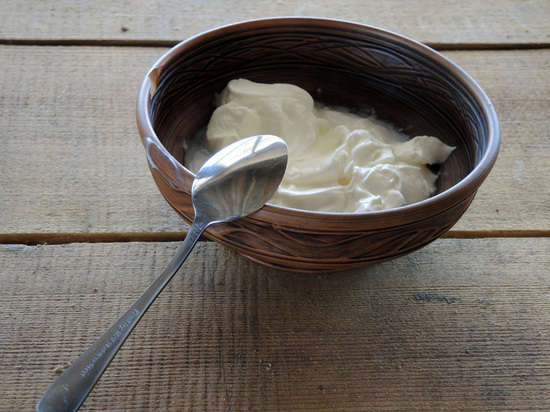The Russians were threatened with a shortage of sour cream and cheese: the problem of dairy culture becomes strategic
[ad_1]

Domestic farmers are sounding the alarm: soon we may be left without sour cream and cheese. We have cows, we have milk, but we don’t have our own starter for the preparation of these products. Dependence on import deliveries – 90%. And if suddenly our Western suppliers impose their own sanctions, including on bacterial starter culture, then you and I will end up with nothing. The Ministry of Agriculture refutes such a scenario, arguing that we have enough stocks of sourdough. To find out how acute the problem is, MK turned to farmers.
My interlocutors cannot understand for a long time when I ask them about the leaven for the same sour cream. Where do they get it and in general, is it on sale, if such a dependence on imports? Finally, we understand each other: farmers do not and cannot have any starter for sour cream. Their production technology is as follows: from the evening milking of cows in a warm room (at a temperature of 36 degrees), a bucket of milk is placed. And in the morning they remove the top layer, which is sour cream. Natural, without any chemicals and additional bacteria that cause fermentation. At the same time, however, the cost of 500 rubles a kilogram. But each of my interlocutors – livestock farmers – has a line of citizens for dairy products.
To my naive question: why the industrial production of sour cream and other fermented milk products does not use such simple (and natural) technologies, the answer was the same:
– So they don’t milk cows like we do, and their milk is completely different! Solid chemistry…
Probably, this has its own homespun truth: industrial, in-line production of food, tens and hundreds of tons per day, or a farmer’s “kitchen”, where you may have heard about “some kind of sourdough” for the first time, two completely different stories …
But all of us, city dwellers, will not be able to use farm dairy products, if only for the reason that there are not so many farmers in Russia. Our destiny is the supermarket and the same in-line production method based on whey and other components, which, as some market participants predict on social networks, are about to run out. Because we are under Western sanctions.
And here is something to think about. According to open data, we have a 90% import dependence on milk starter, and there are practically no biofactories for the production of bacterial starter in the country.
Meanwhile, if we recall the history, then in the USSR each dairy plant or cheese factory had its own workshop for the production of sourdough and all the necessary components. Now there are no such objects. In market times, we began to build modern processing plants using Western technologies, where such facilities are not provided at all..
To date, there remains a small production facility in Uglich and a few small laboratories that are trying to increase the production of sourdough, but so far their share in the Russian market is no more than 10%.
At first glance, the situation is controversial. The Ministry of Agriculture, in pursuit of reports of an impending shortage of sourdough, has already given its own interpretations. That “stocks are still sufficient” and that they continue to flow into Russia. But does this mean that there is nothing to worry about?
According to Igor Abakumov, the host of the Rural Chas program and a cheese maker rolled into one, our dependence on imports is indeed very serious. It was especially aggravated in the “zero years”, when the country switched from “garage”, handicraft cheese making to industrial. Then hundreds of schools and courses on cheese making were formed in the country, many private traders even went to study in Italy and other countries. And along with Western technologies, imported starters immediately went into action. What is a serious risk factor in today’s times!
At the same time, there is no such real threat that all Western suppliers will suddenly refuse their supplies.
“That just doesn’t happen in real life,” he says. – The problem concerns, first of all, large milk processors – in the Pskov region, in Altai and the Krasnodar Territory. But they have reliable supply channels, including alternative ones.
– In which countries do we buy these products?
– For sour cream and cheeses – in Italy, in France and a little in Germany. For two reasons. They are of high quality, the manufacturer has confidence in their product. In addition, they have sourdough in a dry powder form, which allows it to be stored for a long time. Domestic starters are in liquid form, “live”, but they have to be constantly bought and updated, since they are not stored for a long time. In order not to lose the Russian market, we need to master powder starter cultures, this process is lengthy. Even in terms of packaging: sealed bags must be multi-layered, this is a special technology. But the topic of sourdough for industrial production is strategic. By the way, our Ministry of Agriculture understands this and allocates large funds for the implementation of such a state program. The same cheeses are a product of long-term storage, they can lie for 2-3 years and only get better.
[ad_2]
Source link






